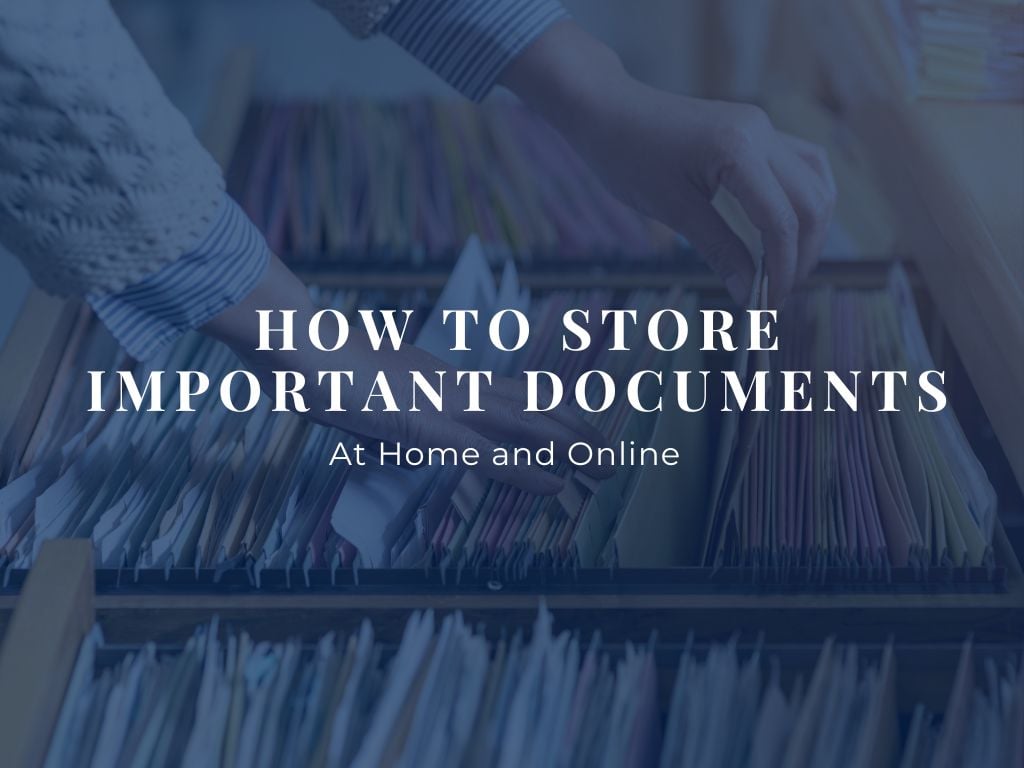
Storing important documents, like financial statements from your financial advisor, isn’t just a matter of organization: It’s key to keeping your information safe and limiting the risk of identity theft. Here’s everything you need to know about storing important documents at home or online.
What Documents Should You Save, and for How Long?
There seems to be no end to paperwork and documents that enter our lives. From bank statements to tax forms to bills, the paperwork can pile up. The good news is you don’t need to keep all of those documents in perpetuity. Even those papers you shouldn’t discard now often don’t need to be kept forever.
You can think of important documents as falling into one of three categories. The first is the documents you’ll need to keep forever, such as birth certificates. Then there are the documents you’ll need to keep for many years. These often relate to assets you own or policies you hold (and could be some of the documents you’ll need when meeting with your financial advisor). As long as you own the assets or policy, these documents remain important to keep. Finally, there are tax documents you’ll need for three years after filing. Below are some examples of each of the three categories of documents.
Documents to keep forever:
- Birth or adoption certificates
- Death certificates
- Marriage license
- Divorce decree
- Social Security card
- Military service or discharge records
Documents to keep for many years (or until you no longer own the asset or terminate the policy):
- Property deed
- Vehicle title
- Business license
- Current insurance policies
- Record of home purchase
Tax documents to keep for three years after filing:
- Business receipts
- Charitable donation receipts
- Medical expense receipts (including for HSAs)
Why Does Safely Storing and Organizing Documents Matter?
A little bit of work now can save you a lot of time and energy down the road. Organizing your important documents can help you find what you need when it comes time to file your taxes, apply for tax deductions, claim a warranty or even prepare for an IRS audit. Safely storing important documents with personal information can also help you dramatically decrease the chances of identity theft, which can cost you time and money.
Where Should You Save Your Important Documents?
Next, you’ll need to decide where and how you’ll store your important documents and how you’ll organize them. How you decide to store and organize your documents is up to you, as long as you have a system that works (and a shoebox does not work for anyone). Here’s what to consider based on where you store your documents.
- Safe deposit box or fireproof safe: This is where you’ll want to store your most important documents, such as birth certificates and Social Security cards. If you choose a fireproof safe at home, you will want to make sure it is stored where it won’t be easily found, in case of a break-in. It’s also a smart practice to share the location of a safe or your use of a safe deposit box with another trusted person. Fireproof safes are often available at stores like Costco, Target, or, of course, Amazon.
- Physical copies at home: Any hard copies of important documents, such as tax documents, with personal information should be kept in a locked location. When you no longer need these documents, they should be shredded.
- Digital copies: Keeping digital files is a great way to limit clutter. If you keep digital copies of your important documents, you’ll want to make sure you still maintain an organization system. You’ll also want to keep your documents password protected and encrypted with up-to-date encryption software.
Free Planning Resource
A comprehensive checklist to help you organize documents, clarify wishes, and ease the transition for your loved ones.
Download the Beyond the Will Checklist
Access to Files in an Emergency
The final thing you’ll want to keep in mind when storing important documents is how they’ll be accessed in the case of an emergency. Whether you keep hard copies in a locked file folder at home or stored in the cloud, you’ll need to make sure someone you trust knows how to access them if you can’t.
Invest Time in Storing Important Documents
Organizing and storing important documents may feel like a daunting task, but even tiny steps taken toward improving your existing setup can pay off down the road. When you’re ready to review your financial records as part of your plan for the future, reach out to Carnegie. In the meantime, take a look at our free checklist of important documents to bring when you meet with a financial advisor for the first time.
Need a Financial Advisor?
If you are currently looking for help with financial planning, contact us. We are happy to schedule an introductory meeting at your convenience.


